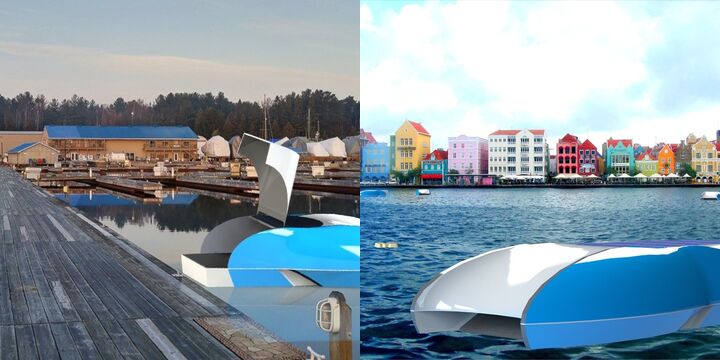Remora: Trash-Eating Aquadrone
The Problem
Nearly 1.4 billion pounds of trash are dumped into our shared oceans every year, or one garbage truck every minute. 80% of this trash is sourced near-shore and, if not collected, destabilizes delicate ecosystems, killing millions of marine animals every year and ultimately climbing up the food chain and onto our plates. Once trash has entered the ocean and has been broken down into microplastics, cleanup becomes a logistical nightmare. This is due, in part, to the low trash density, the difficulty of transporting massive amounts of trash across the ocean, and the lack of accountability for this pollution. Therefore, global issues like these require widespread local solutions. In order to combat this crisis, local waterfront municipalities need effective, affordable, and salable solutions like ours.
Our Proposal
Our team is developing Remora: a system of trash-eating aquadrones to collect this trash in ports and harbors before it flows to the open ocean. These drones can navigate either autonomously, using GPS and computer vision to detect trash and avoid obstacles, or via remote control. Our drones use their suite of onboard sensors to constantly gather environmental data. Not only can we provide municipalities and waterfront authorities with raw or analyzed environmental data, our system utilizes the data that they collect and machine learning to predict the locations of high-density trash hotspots for more efficient route mapping. In doing so, they can maximize their efficiency by collecting more trash across their coverage areas. Once the drones reach capacity, they return to docking hubs where they drop off their trash for centralized pick-up and charge their batteries using solar systems. This self-operating system requires minimal human interaction, can scale to meet changing demand, and collects more trash at a lower cost than current, outdated solutions.
We Assume that...
1) Marine trash pollution will continue to be a global issue.
2) Tightening regulations and increasing public concern will continue to provide demand for a solution.
3) Trash hotspots can reliably be predicted.
4) The benefit of low operating costs will outweigh upfront manufacturing costs.
5) We are able to collect more trash than current solutions.
Constraints to Overcome
While the issue of marine plastic pollution is rapidly becoming more severe, it is also growing in the political and public consciousness, creating a demand for new solutions. Separately, the technology necessary to create an autonomous low cost vehicle has only recently become available, and low-cost automation technology is only improving. The combination of these two factors catalyzed the creation of Remora. Prior to our solution, marine debris cleanup technologies could not operate at a low enough cost on a large enough scale to put a sizable dent in the plastic pollution crisis.
Current Work
Our next 3 to 6 months consist of further customer research in order to review/confirm the validity of our business model and IP development. Continuing development of the prototype is also a big goal. We are currently working on fabricating the mechanical structure while developing our route mapping and computer vision software for our autonomous systems. We aim to have a viable prototype which combines the vehicle with the collection system and operational software by the end of the year. With this we have been in close discussion with the Port of San Diego and are in the application process for their blue economy incubator. This incubator will provide us with an environment and resources to conduct a pilot project in.
Current Needs
The team is currently working out of our houses and through the UCSD Basement, a tech incubator on campus. We are looking to further develop/confirm our business model and business consulting can help us with this. Patent support will be useful as we are aiming towards guarding our IP. Additional funding will help us to build and develop our prototype. The components we aim to work on are the physical body of the device along with the visual systems. The team has been working with AWS for the visual systems and additional tech expertise/guidance on this front would be useful. Default Google Docs have been our main form of full team file sharing, however upgrading to GSuite (or similar service) will expand our storage capabilities and mobile communication, especially with the increased amount of social distancing work that is being performed at the moment.
